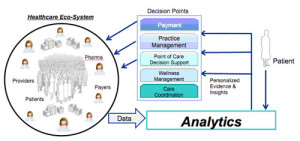Pathologists and clinical laboratory administrators should stay alert to the impact on the traditional role of pathology with increasingly effective, predictive clinical decision-support software
To support the transition to predictive healthcare—and in a move that is a separate but parallel initiative to its Watson healthcare program—IBM (NYSE: IBM) recently unveiled its new healthcare analytics software.
By mining structured and unstructured data, the software will enable physicians to more accurately diagnose and treat patients. This could mean significant improvements in patient outcomes and savings in overall healthcare costs. It could also mean improved utilization of clinical laboratory tests and motivation by clinicians to more closely consult with pathologists on the interpretation of medical laboratory tests.
IBM’s Software Is Named ‘Patient Care and Insights’
IBM calls its software Patient Care and Insights (PCI). It features advanced analytics and care management capabilities to leverage patient information, according to IBM’s press release and PCI web page. PCI will allow healthcare providers to integrate and analyze the full breadth of patient information that is sourced from multiple systems and different care providers. The goal is to foster new insights and create opportunities to intervene in personalized ways.

IBM’s new Patient Care and Insights software identifies patients who are similar to an index patient. This provides decision support for doctors and enables comparative effectiveness research analysis. The program will help healthcare organizations maximize the value of information for treating patients, thus improving outcomes and lowering overall healthcare costs. Medical laboratory test data comprise part of the data sets accessed by this software program as it uses patient similarity analytics to process the data and develop recommendations for its physician-users. (Graphic by IBM.)
“Healthcare professionals today need an integrated view of relevant clinical and operational information so they can make better decisions faster while improving quality of care,” declared Rustan Williams, Vice President of Information Services/Technology Systems and CIO at The Evangelical Lutheran Good Samaritan Society, in the press release. The Evangelical Lutheran Good Samaritan Society is the largest not-for-profit provider of senior care and services in the United States. “Discovering early intervention opportunities…can dramatically change a [patient’s] possible outcome and also help reduce costs for constituents across the healthcare community,” Williams added.
Similarity Analytics Forms Core of New Healthcare Analytics Software
At the core of PCI is patient similarity analytics. Similarity analytics is a set of core capabilities and algorithms that allow healthcare professionals to examine thousands of patient characteristics at once.
The software allows healthcare organizations to mine structured and unstructured data. Such data may range from vital metrics and medical laboratory test results to physicians’ notes, faxes and diagnostic test reports.
James Kobielus, IBM’s Senior Program Director of Product Marketing, Big Data Analytics Solutions, observes that IPC’s Patient Similarity Analytics for Treatment Comparison does the following:
- Analyzes aggregated demographic, social, clinical and financial factors along with unstructured data such as physicians’ notes.
- Factors the specific health history of each individual patient into the creation of a personalized healthcare delivery plan.
- Enables healthcare professionals to examine thousands of patient characteristics at once to generate personalized treatment plans.
- Identifies other patients with similar clinical characteristics to see what treatments were most effective or what complications they may have encountered.
- Supports patient-physician matching so an individual is paired with a doctor that is optimal for a specific condition.
Kobielus made the statements in a guest post at IBM’s Software Blog SmarterAnalytics.com.
“With this solution, caregivers can better tap into the collective memory of the care delivery system to uncover new levels of tailored insight or ‘early identifiers’ from historical/long term patient data that enable doctors and others to help manage a patient’s healthcare needs well into the future,” IBM contended in its press release.
Technology Is Similar to IBM Watson Computer System
PCI software uses some of the same natural processing language technology as IBM’s Watson supercomputer. This allows healthcare professionals to analyze both structured and unstructured data, IBM stated in its press release. Providers can then use PCI’s predictive analysis capabilities to identify patients at risk for developing illnesses or needing additional interventions. Furthermore, providers can use predictive modeling, trending, and scoring to anticipate patient outcomes and evaluate the potential effects of interventions.
One interesting aspect to this IBM initiative is that it is a parallel effort to use information technology to assist physicians in how they diagnose and treat patients. Along with Watson, PCI gives IBM two products to offer physicians and other clinicians.
Useful Role for Pathologists and Clinical Laboratory Professionals
The progress IBM is making with its health informatics solutions suggests that pathologists and specialists in clinical laboratory management can look for to the approaching day when most physicians will be working intimately with these types of decision-support systems. This opens the opportunity for pathologists and laboratory professionals to play a role in developing the algorithms that incorporate lab test data.
This would be an expected development in the evolution of these various systems that will blend clinical decision support functions with evidenced-based medicine guidelines. That is because these analytics software systems sift through massive quantities of disparate sets of healthcare data that include a significant proportion of anatomic pathology information and clinical pathology test data.
Thus, ongoing development of increasingly sophisticated healthcare analytics that help translate data into actionable intelligence for clinicians may create new opportunities for pathologists to maintain their role as a crucial link in the diagnosis and treatment activities of physicians.
—Pamela Scherer McLeod
Related Information:
Analytics at work in healthcare
Patient Similarity Analytics for Personalized Healthcare




I worked on a similar project back in 1998; it was analytical driven and chronic disease specific. I am very excited that the industry (IBM) finally has a robust system that would facilitate better patient outcomes and a more predictable algorithm for physicians.